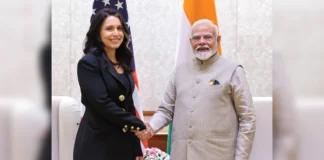The expulsion of Ministers Wimal Weerawansa and Udaya Gammanpila from the Cabinet has come as no surprise. They have got under the skin of Finance Minister Basil Rajapaksa, who is considered the power behind the throne. He calls the shots in the SLPP. The SLPP dissidents have also irked President Gotabaya Rajapaksa. The ruling family is therefore all out to neutralize them.
The recent SLPP rally in Anuradhapura was a foretaste of what would befall the governments’ dissident faction consisting of 11 political entities. None of the SLPP coalition partners were invited to the event, which was a show of strength meant for the consumption of not only the Opposition but also the dissidents in the government. The Rajapaksa family’s message has been clear; the SLPP can do without any other parties and will go it alone at future elections. Basil has been saying this since internal problems began to manifest themselves in the SLPP. His dream is to form an all-SLPP government because he knows the leaders of the SLPP coalition partners are not well disposed towards him. Hence Weerawsansa’s claim that someone in the government is doing a Felix Dias, the headstrong politician who controlled the SLFPP to all intents and purposes, in early and mid-1970s, and smoked out the leftists from the SLFP-led United Front government, weakening the coalition government as well as the SLFP, which was reduced to only eight seats in the parliament at the 1977 general election.
Prime Minister Mahinda Rajapaksa has apparently lost interest in active politics, and the affairs of the SLPP. Mature enough to realize how damaging internal disputes could be to a government—his own government fell in 2015 due to an intraparty conflict—he tried to reconcile the warring factions in the SLPP. At the SLPP’s national convention in November 2021, he recognized the contribution that the constituents of the coalition had made towards the SLPP’s impressive wins at the 2018 local government elections, the 2019 presidential election and the 2020 parliamentary polls; he called upon all SLPP constituents to sink their political difference and work together as a team. His efforts have been in vain. The Basil faction is bent on taming the SLPP dissidents, especially Weerawansa and Gammanpila, and the latter are determined to continue with their rebellion.
Bad blood
There has been a lot of bad blood between Basil and the dissident duo, Weerawansa and Gammanpila. The latter strove to prevent the former from entering the parliament as a National List MP. The 19th Amendment introduced by the yahapalana administration debarred dual citizens from holding political office. Gotabaya Rajapaksa chose to give up his American citizenship to run for President as a result. But Basil retained his US citizenship, and when the 20th Amendment was introduced, Basil wanted the above-mentioned provision removed so that he could enter the parliament as a National List MP. When Weerawansa and Gammanpila vehemently opposed the move because they did not want Basil in the parliament, President Rajapaksa intervened to settle the dispute. Basil has since been out for the blood of Weerawansa and Gammanpila.
The book that led to sackings

There are several reasons why the ruling family has struck back, and gone so far as to sack Weerawansa and Gammanpila from the Cabinet. The immediate reason, however, is the recent launch of the SLPP dissidents’ de facto policy statement, Mulu Ratama Hari Magta (Guiding the country in the right direction), which is considered a prototype of an election manifesto. The event was held with former President Maithripala Sirisena’s participation much to the consternation of the Rajapaksas, who cannot be unaware that the SLPP dissidents are planning to contest future elections as a separate electoral alliance if push comes to shove.
The dissidents’ declaration (in Sinhala) issued by 11 parties in the SLPP coalition, basically identifies the crisis and proposes how to tackle it. A summary of the contents of the declaration is as follows:
The country is beset with a fivefold crisis which is due to
- The depletion of foreign reserves and the government’s inability to pay foreign loan installments and raise funds for essential imports, and the resultant debt crisis
- A sharp decrease in state revenue, tax frauds, and bad management that has aggravated the economic crisis, and collapse of the writ of the state and public service
- The collapse of the local food production system threatening food security and adversely affecting livelihoods of smallholders
- The rehabilitation of the local industrial system
- Forces hostile to the country making use of the erosion of public trust in the government due to the economic crisis to create a political turmoil so as to weaken the state and advance their neo-imperialist agenda
According to the SLPP dissent group, the genesis of the present crisis could be traced back to 1977, when the economy was opened up by a UNP-led government. Harmful economic reforms in the name of economic liberalization have led to the present crisis.
The current economic system based on urban development and trade and sustained with foreign debt has endangered the local production system and food security, and adversely impacted those belonging to the lower strata of society.
There is a need for a new economic model that enables the country to face the crisis in the short term, and strengthen the national economy in the long run, providing opportunities to the people and bringing about social justice.
The dissents have proposed 10 ways of overcoming the crisis:
- Shoring up foreign reserves to revive the economy
- Preventing rackets involving taxes, financial management, re-exportation and thereby regaining public confidence
- Increasing national production, and protecting farmers, fishers, industrial workers and small-time entrepreneurs
- Strengthening the local industrial sector
- Empowering small-time producers caught in the microfinance trap, liberating women and achieving economic development with their help
- Changing the national consumption culture and motivating the public to help the country emerge from the crisis
- Enabling the youth to become entrepreneurs and adopting other measures to solve their problems to prevent them from leaving the country
- Ensuring social justice and protecting vulnerable sections of society
- Safeguarding national security by handling issues concerning the developments Indo-Pacific region, and properly managing state assets for the benefit of the public
- Eliminating corruption
What the dissidents’ declaration signifies is that the government has failed to identify the causes of the present crisis much less find a solution, and it will not be able to do so. In other words, in the opinion of the SLPP rebel group, unless the government makes an immediate course correction in keeping with their declaration, they are ready to provide an alternative, probably under Sirisena’s leadership.
Other dissidents
Most members of the SLPP’s parliamentary group are disgruntled because they have no say in the running of the government, which they say is controlled by one family. Some of them are treading cautiously for fear of being sacked. The Mahajana Eksath Peramuna led by Minister Dinesh Gunawardena and Minister Douglas Devananda’s Eelam People Democratic Party pulled out of Wednesday’s event at the eleventh hour.
There are several other ministers who are not in the good books of Basil. One of them is Minister of Highways and Chief Government Whip Johnston Fernando, who is close to Prime Minister Mahinda Rajapaksa and therefore safe. He does not publicly take on the SLPP leadership, but complains in private about harassment he suffers at the hands of the Basil group, which is all out to neutralize or even get rid of dissidents.
The sacking of Weerawansa and Gammanpila has come as a blow to the government’s unity and stability. It is not likely to have a deterrent effect on other dissidents, who are likely to go ahead with their protests. Instead, it is likely to make them drift towards the SLFP, which is the only alternative they could think of. In fact, they have already expressed their willingness to work with the SLFP as could be seen from the participation of SLFP leader Sirisena at the launch of their declaration.



 Logging you in...
Logging you in... Loading IntenseDebate Comments...
Loading IntenseDebate Comments...

